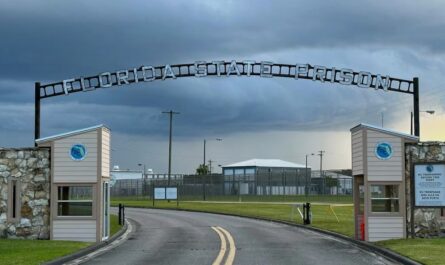After a routine traffic stop on Interstate 70 led to the detention of a 19-year-old college student by Immigration and Customs Enforcement (ICE), a Mesa County sheriff’s deputy may have broken Colorado state laws that say local police can’t help federal immigration authorities.
On June 5, Caroline Dias Goncalves was pulled over by a Mesa County deputy for driving too close to a semi-truck on I-70 outside of Loma. The Mesa County Sheriff’s Office says the traffic stop took less than 20 minutes and Dias Goncalves was given a warning before being let go.
After Dias Goncalves continued her trip to Denver and got off the highway, ICE agents stopped her, arrested her, and took her to the Aurora ICE detention center. Dias Goncalves was born in Brazil and came to the U.S. when he was seven years old. He has lived in Utah for 12 years and is now asking for asylum.
During the stop, the deputy asked Goncalves about her accent and where she was born, which can be seen on body camera footage. Goncalves said she was “born and raised” in Utah and had lived there for “about 12 years” when asked. When asked to explain further, she said she was born in Brazil. The deputy said, “Oh, that’s cool.”
The Mesa County Sheriff’s Office admitted that the clues about Dias Goncalves were passed around in a chat room that federal agents also used. According to the sheriff’s office, the group was originally meant to help stop drug trafficking, but federal agents were using them to enforce immigration laws instead.
“Through our Administrative Investigation, we have learned that the federal representatives within the communication group began using the material collected for drug interdiction efforts to extrapolate immigration information for the purposes of ICE enforcement,” the sheriff’s office said in a tweet.
The sheriff’s office said that using the information was “against Colorado law” and that it “led to ICE getting in touch with Dias Goncalves later.” Since then, the department has been taken out of the communication group.
A Democrat named State Sen. Julie Gonzales helped get a number of laws passed in Colorado to build trust between police and immigrants. She said the traffic stop shows why the laws need to be in place.
“I’m furious because Mesa County Sheriff’s Office has themselves admitted that that collaboration is in direct contravention of our state law,” Gonzales told me. The question is what should you do and who should you trust when the police say, “Yeah, sorry about that.” “We broke the law.”
Hans Meyer, an immigration lawyer who worked with Gonzales to get state laws passed that make it harder for local police and federal immigration officials to work together, said the traffic stop shows the kind of problems the laws were meant to fix.
“This traffic stuff is one of the exact reasons we were to pass this state legislation six years ago, because this was happening over and over and over again in different parts of the state,” said Meyer.
Senate Bills 21-131 and 25-276 are two of the laws that limit ICE’s access to personal information and stop local police from holding people without a warrant just because they broke immigration laws. Some people also want to know if the deputy stretched out the stop by asking Dias Goncalves to wait in his car so that ICE could detain her later. That would be against HB 19-1124, which says that police can’t honor civil immigration detainers without a court order and can’t hold people past their release date just for ICE.
Meyer says that this is an example of how police are making up criminal investigations to get around state protections. The message board was used for drug-related activities, but there is no proof that Dias Goncalves was being investigated for them.
“What we’re seeing is that there’s a fabrication of context that law enforcement is investigating some sort of unnamed criminal activity, but it’s de facto used for immigration enforcement,” said Meyer.
Jonathan M. Hyman, Dias Goncalves’ lawyer, said that she has paid her bond and will be let out of jail. Hyman asked what the traffic stop was about and voiced concerns about how the multi-agency task force was working.
People are worried about racial profiling and constitutional violations because of what happened. Gonzales, a Chicana whose family has lived in southern Colorado for many generations, said the questioning brought to light problems that her community and Latino residents still face.
Gonzales said that lawmakers want to see the full group chat messages to see how serious the possible violations are and if they affected other Colorado residents in the same way.
“We want to request and obtain full messages within that text thread because who knows how many other Coloradans this may have happened to,” said Gonzales.
Significant fines could be imposed for the violation. Colorado law says that agencies that break these specific state laws can be fined up to $50,000 per violation.
“We put in place harsh punishments.” “We added $50,000 per violation to our state laws in 2021, and we’ve now brought those out here in 2025,” Gonzales said.
But, she said, “a $50,000 civil penalty for Mesa County Sheriff’s Office will do nothing to un-destroy this young woman’s life.”
Even though police officers could be held responsible, Dias Goncalves is now facing immigration proceedings that could lead to deportation. The case shows how people are affected for a long time, even after police violations are acknowledged.
There are bigger problems with immigration enforcement going on at the same time as this incident. It also makes people wonder if state sanctuary laws are being followed, which are meant to build trust between immigrant communities and local law enforcement.


 by
by 
